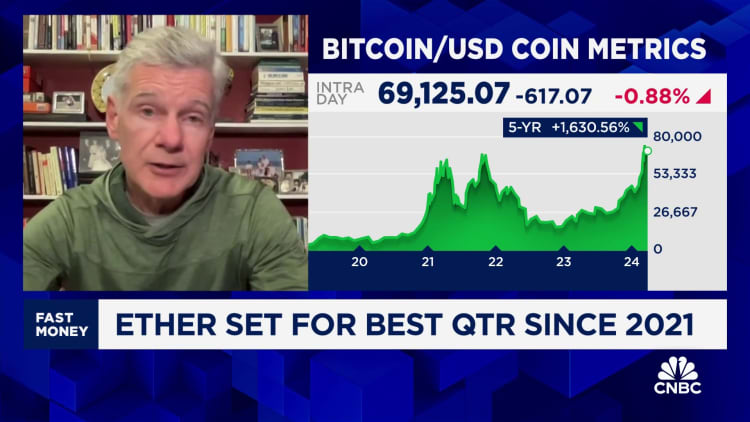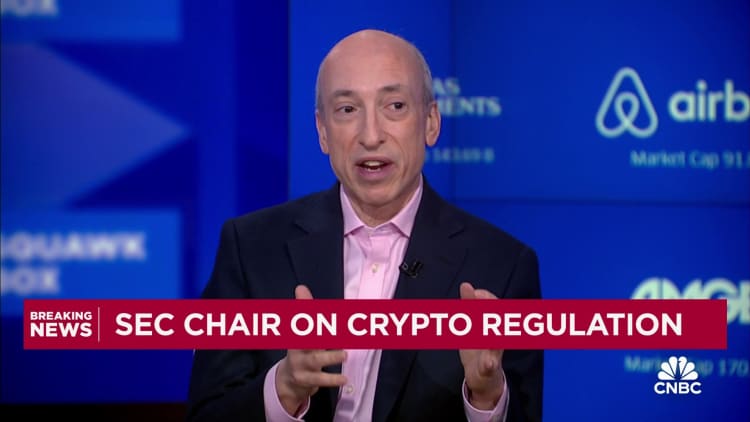In the wake of bitcoin’s new highs, South Korea’s ‘kimchi premium’ is in the spotlight again


A bowl of kimchi, a fermented vegetable side dish that is a staple in all Korean meals
Kitzcorner | Getty Images
You may have heard of the “Korea discount” in South Korea’s stock markets. Now, get ready for the “kimchi premium,” named after the popular side dish of fermented vegetables that’s a staple in Korean cuisine.
The “kimchi premium” refers to the price gap in cryptocurrencies, especially bitcoin, when listed in South Korea versus those listed in U.S. or European exchanges.
While this could be seen as an arbitrage opportunity for some, it’s not so easy to make a quick buck.
The kimchi premium is in the spotlight again after bitcoin reached all-time highs in mid-March, soaring past $73,000 to a record high on March 13, according to Coin Metrics data. The digital currency has since fallen below the $70,000 level.
As bitcoin tested new highs, the kimchi premium also soared. According to cryptocurrency data provider Cryptoquant, the Korea Premium Index reached its highest level since May 2021 on March 16, reaching 10.88%.
That means bitcoin’s trading price in South Korea was roughly 10% higher than the global spot price.
Back in 2017, FTX founder Sam Bankman-Fried saw an arbitrage opportunity in the price gap across different exchanges. The CEO of failed crypto exchange FTX was last week convicted for crypto fraud and sentenced to 25 years in jail.
As a quant trader in 2017, he noticed the price discrepancy of bitcoin could sometimes be as much as 60%. The arbitrage opportunity was especially compelling in South Korea, where prices there were significantly higher than in other countries.
He went on to launch his proprietary trading firm Alameda Research to start trading the digital currency full time, raking in a million dollars a day in some cases.
In 2022, the then 30-year-old billionaire told CNBC he was drawn to the industry because the wide arbitrage opportunities seemed “too good to be true.”
The ‘premium’
Bitcoin frequently trades at a higher price in South Korea compared to other markets, according to research by the University of Calgary.
While the average kimchi premium was 4.73% between January 2016 and February 2018, it hit levels as high as 54.48% in January 2018, according to the report that was published in 2019.
Why is there a price discrepancy?
It occurs because crypto, unlike stocks or bonds, are decentralized digital assets which use blockchain technology that’s not controlled by a central authority, and can therefore be traded at different prices around the world.
One factor for the price gap is the high demand for cryptocurrencies in South Korea, in what has sometimes been referred to as “a closed market environment.”

To prevent money laundering in crypto trading, the country’s Financial Services Commission has implemented what is known as a “real name” policy, requiring a person’s domestic virtual asset trading account name to match the name on their deposit account with a bank.
Only South Korean nationals or foreigners with resident registration cards are allowed to open full-fledged bank accounts in the country, effectively locking out overseas access to its domestic crypto exchanges.
“South Korea requires a specific type of bank account linked to an individual in order to open a crypto exchange account, which makes it challenging for institutional players to enter the crypto market,” Crypto data platform Chainalysis said in a 2023 report.
Bitcoin prices in South Korea are pushed above those in other global bourses, as demand is driven mainly by retail investors since institutional and foreign investors are not able to participate freely.
Chainalysis added South Korea received a total crypto value of over $111.82 billion from July 2022 to June 2023 — the largest amount in any East Asian countries, surpassing even Japan and China, the region’s largest economies.
The report also noted that South Korea appears to be the least institutionally driven market in East Asia based on transaction sizes.
“That’s likely due to local regulations that make it difficult for financial institutions to trade,” the report said.
Arduous arbitrage
The kimchi premium may appear to be an arbitrage opportunity, but it’s not so straightforward.
In theory, an investor can buy bitcoin on an international exchange at a lower price, transfer the cryptocurrency to a South Korean bitcoin exchange at a higher price, and make a risk-free profit by selling it on the South Korean exchange.
However, the fact that the South Korean won is regulated makes this arbitrage strategy difficult for international investors, explained Baik Seunghoon, country manager for South Korea with crypto mining firm GoMining.
He pointed out that the won is a highly restricted currency, and won transfers outside the country are tightly controlled.
Citing South Korean capital controls, Baik pointed out that so-called “small overseas remittance agencies” are only allowed to remit up to $10,000 per transaction for each individual, up to an accumulated amount of $100,000 for the same person per year.

This means there’s a limit to how much fiat currency can be taken out, which by extension, limits the rate of gains that traders can cash out.
There are also other risks to this arbitrage strategy, according to research by University of Calgary.
First, the transfer of bitcoin from a foreign exchange to a South Korean exchange takes time, and during that time, the price of bitcoin could change.
Checks by CNBC revealed that transfers can take anywhere from one hour to one day for cryptocurrencies to be shifted to an external wallet.
This means that investors run the risk of seeing the kimchi premium become smaller or completely disappear during the time it takes to execute the arbitrage trade.
Paul Brody, global blockchain leader at EY, told CNBC that while the kimchi premium has been around for a while, his view is that it’s harder to conduct the arbitrage trade today than in the past.
“What’s different now is that in many other parts of the world, it is more and more difficult to send money through the blockchain without doing any KYC,” Brody pointed out. He was referring to the know-your-client process, where customers’ identities need to be verified by financial institutions so as to mitigate financial crime.
Furthermore, he said exchanges that are compliant with regulations will limit an investor’s ability to send money overseas unless an investor has the necessary documentation and regulatory support.
In short, the reality is that time, fees and capital controls can introduce complications, making capitalizing on this strategy either less attractive or outright unviable.
— CNBC’s MacKenzie Sigalos and Kate Rooney contributed to this report.









